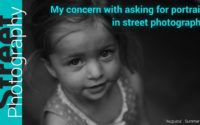Street Photographers have a responsibility for dignity & privacy rights too!
The rules and protections for photographing people in a public space differ from country to country. Surely though, irrespective of the laws, street photographers have a responsibility to care about the dignity, the privacy and the personal rights of the people we photograph? I think we do.
Rights in the UK and the US
In the Anglo-American world there is a general right to photograph people in a public space. The rules seem to take no account for the privacy or the dignity of the individual. This is not simply the rights necessary for a free-press and journalism; they go far further and in my view unnecessarily so.
Whilst I don’t consider it strictly “Street Photography”, taken to extremes, some will even use their perceived rights to stick a flash into some stranger’s face and fire off a picture without warning or compassion.
Journalists have both a need and rights to capture what is going on. An interesting point in the guidelines from, and for, the Metropolitan Police (Greater London, England) points out that “citizen journalists” also have the same rights. Yet such citizen journalists have no training and have no requirement to follow journalistic guidelines, such as the compassionate treatment of sources or photographed persons, in the same way as journalists.
Since Diana’s death in Paris there were attempts to curtail the paparazzi, but this created a problem for journalistic freedoms. There are laws in some countries, but finding a balance is difficult. Photographing a person purely because they are prominent does not make a story news. A private life is still private even if the person is a singer, comedian or princess.
Exposure of politicians is critical for democracy to work!
Politicians are different. Their position is held based upon trust and conformity to cultural norms, anything that shows deviation from their declared position, no matter how personal, is news. Exposure of politicians is critical for democracy to work!
I suspect that the legal “free for all” that exists in both the UK and the USA is probably derived by the significant CCTV coverage that these countries have in place. Not only businesses but also the governments of these countries, make extensive use and are dependent upon the data capturing that video footage provides.
Rights in Germany
In Germany a person going about their normal business in the street or in public has a right to privacy. There is no right for any photographer to publish photographs. There are however exceptions, but the bias is more towards personal rights and not the photographer.
Journalists are a special group. Firstly they do have more latitude on reporting, but they also have a training and a need to justify the use of photographs that they publish. The images must be necessary and in the public interest for a news story and not just artistic whim as per a street photographer.
There are also exceptions when a public event is taking place. A procession of floats with people aboard, or in the parade, is appropriate subject matter. As the collection and mass of people would be too. But focus on an individual who happens to be there with no participation in the presentation, not on the stage so to speak, and the game is different.
A person attending a public street event and relieving themselves behind the bushes clearly expects this to be a private “moment” and it can only be considered personally “decisive”.
However even a person watching the procession who is the subject of a photograph and clearly identifiable, no matter how innocuous the scene, is also afforded privacy rights. They have the last say on their “image” being released to a public audience.
Hitler and his cronies collected data about everyone…
German history almost certainly plays an important role in the approach the law has taken. Hitler and his cronies collected data about everyone and used this to justify and perform inhumane, criminal and mentally sick acts. It appears though, that other countries failed to learn the lessons. They miss the impact data collection can have on the democratic, social and moral aspects of a society. Some would argue that Germany has gone too far and perhaps they have, a little. But I would argue many other countries have not gone far enough, nor learnt from other peoples’ past mistakes.
Conclusion
For a society to work each of us needs to go about their daily lives without the embarrassing moments being recorded and circulated to the world forever. In this it is important to remember that the subject decides what is embarrassing and not the onlooker.
Whilst, as street photographers, we may feel empowered to follow our passion through the legal rights we get; we should remember we can equally be the cause for discomfort and sense of intrusion that some will experience. In addition we are an accomplice, albeit unintentionally, in creating and supporting a tracked and monitored society. And because of this we may not have actually contributed to our social well-being at all.
I personally take great care about the people that I photograph, not only in street photography but also in portraiture. It is not that the legal repercussions in Germany concern me, as they are relatively minimal, but I care about the ethical and compassion aspects of my subject’s feelings.
…identifying features of a person are rarely necessary…
I work to use people to enhance the scene, by using the person or people to provide an organic element, a scale and a context to an image. Because of this the actual face or identifying features of a person are rarely necessary for my street photographs.
In my view each of us needs to find a position that we consider morally correct and not just rely upon the law to protect our “rights to create art” at whatever the cost to others.
It seems to me that issues of care and consideration are easy to notice when we are the ones affected. But it makes more sense to also consider each photographic opportunity from the perspective of the subject(s) being photographed and not just ours as “artists”.
Alex.,



